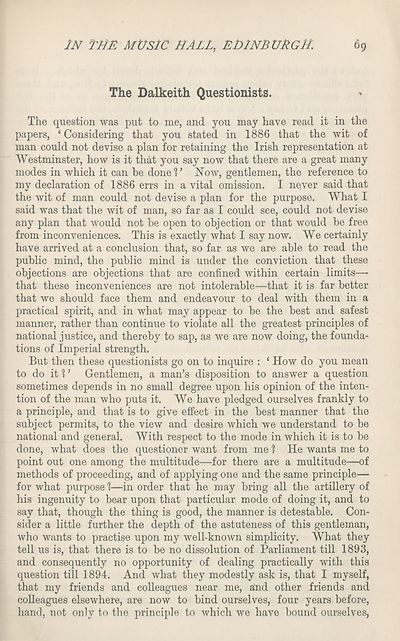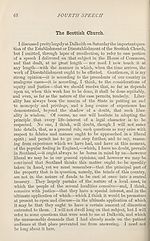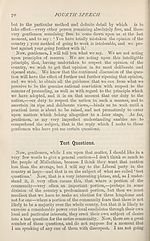Download files
Complete book:
Individual page:
Thumbnail gallery: Grid view | List view

IN THE MtlSlC NALL, EDINBUEGN. 69
The Dalkeith Questionists.
The question was put to me, and you may have read it in the
papers, ‘ Considering that you stated in 1886 that the wit of
man could not devise a plan for retaining the Irish representation at
Westminster, how is it that you say now that there are a great many
modes in which it can he done?’ Now, gentlemen, the reference to
my declaration of 1886 errs in a vital omission. I nqver said that
the wit of man could not devise a plan for the purpose. What I
said was that the wit of man, so far as I could see, could not devise
any plan that would not be open to objection or that would be free
from inconveniences. This is exactly what I say now. We certainly
have arrived at a conclusion that, so far as we are able to read the
public mind, the public mind is under the conviction that these
objections are objections that are confined within certain limits—
that these inconveniences are not intolerable—that it is far better
that we should face them and endeavour to deal with them in a
practical spirit, and in what may appear to be the best and safest
manner, rather than continue to violate all the greatest principles of
national justice, and thereby to sap, as we are now doing, the founda¬
tions of Imperial strength.
But then these questionists go on to inquire : ‘ How do you mean
to do it % ’ Gentlemen, a man’s disposition to answer a question
sometimes depends in no small degree upon his opinion of the inten¬
tion of the man who puts it. We have pledged ourselves frankly to
a principle, and that is to give effect in the best manner that the
subject permits, to the view and desire which we understand to be
national and general. With respect to the mode in which it is to be
done, what does the questioner want from me 1 He wants me to
point out one among the multitude—for there are a multitude—of
methods of proceeding, and of applying one and the same principle—
for what purpose?—in order that he may bring all the artillery of
his ingenuity to bear upon that particular mode of doing it, and to
say that, though the thing is good, the manner is detestable. Con¬
sider a little further the depth of the astuteness of this gentleman,
who wants to practise upon my well-known simplicity. What they
tell us is, that there is to be no dissolution of Parliament till 1893,
and consequently no opportunity of dealing practically with this
question till 1894. And what they modestly ask is, that I myself,
that my friends and colleagues near me, a'nd other friends and
colleagues elsewhere, are now to bind ourselves, four years before,
hand, not only to the principle to which we have bound ourselves,
The Dalkeith Questionists.
The question was put to me, and you may have read it in the
papers, ‘ Considering that you stated in 1886 that the wit of
man could not devise a plan for retaining the Irish representation at
Westminster, how is it that you say now that there are a great many
modes in which it can he done?’ Now, gentlemen, the reference to
my declaration of 1886 errs in a vital omission. I nqver said that
the wit of man could not devise a plan for the purpose. What I
said was that the wit of man, so far as I could see, could not devise
any plan that would not be open to objection or that would be free
from inconveniences. This is exactly what I say now. We certainly
have arrived at a conclusion that, so far as we are able to read the
public mind, the public mind is under the conviction that these
objections are objections that are confined within certain limits—
that these inconveniences are not intolerable—that it is far better
that we should face them and endeavour to deal with them in a
practical spirit, and in what may appear to be the best and safest
manner, rather than continue to violate all the greatest principles of
national justice, and thereby to sap, as we are now doing, the founda¬
tions of Imperial strength.
But then these questionists go on to inquire : ‘ How do you mean
to do it % ’ Gentlemen, a man’s disposition to answer a question
sometimes depends in no small degree upon his opinion of the inten¬
tion of the man who puts it. We have pledged ourselves frankly to
a principle, and that is to give effect in the best manner that the
subject permits, to the view and desire which we understand to be
national and general. With respect to the mode in which it is to be
done, what does the questioner want from me 1 He wants me to
point out one among the multitude—for there are a multitude—of
methods of proceeding, and of applying one and the same principle—
for what purpose?—in order that he may bring all the artillery of
his ingenuity to bear upon that particular mode of doing it, and to
say that, though the thing is good, the manner is detestable. Con¬
sider a little further the depth of the astuteness of this gentleman,
who wants to practise upon my well-known simplicity. What they
tell us is, that there is to be no dissolution of Parliament till 1893,
and consequently no opportunity of dealing practically with this
question till 1894. And what they modestly ask is, that I myself,
that my friends and colleagues near me, a'nd other friends and
colleagues elsewhere, are now to bind ourselves, four years before,
hand, not only to the principle to which we have bound ourselves,
Set display mode to:
![]() Universal Viewer |
Universal Viewer | ![]() Mirador |
Large image | Transcription
Mirador |
Large image | Transcription
| Antiquarian books of Scotland > Politics & government > Political speeches in Scotland in 1890 > (73) |
|---|
| Permanent URL | https://digital.nls.uk/126569166 |
|---|
| Description | Thousands of printed books from the Antiquarian Books of Scotland collection which dates from 1641 to the 1980s. The collection consists of 14,800 books which were published in Scotland or have a Scottish connection, e.g. through the author, printer or owner. Subjects covered include sport, education, diseases, adventure, occupations, Jacobites, politics and religion. Among the 29 languages represented are English, Gaelic, Italian, French, Russian and Swedish. |
|---|

